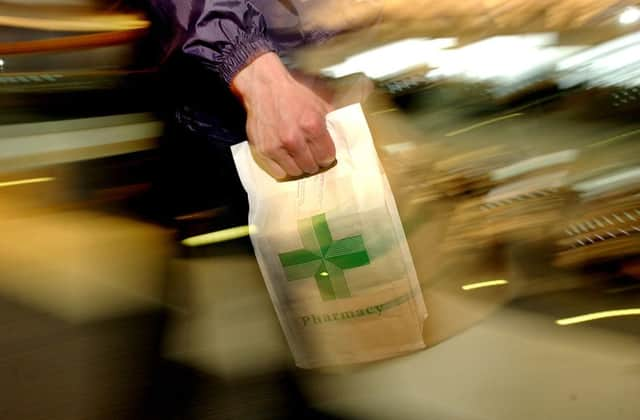Probe into UK pharmacies '˜freely prescribing antibiotics'
This article contains affiliate links. We may earn a small commission on items purchased through this article, but that does not affect our editorial judgement.


The General Medical Council (GMC) launched the probe based on evidence collected by BBC Radio 5 live, and said “the overprescribing of antibiotics risks the health of us all”.
The study looked at 17 UK-based pharmacies selling antibiotics online and found that, while most appeared to operate within National Institute for Health and Care Excellence (Nice) guidelines, in one case three prescriptions were issued in the space of 24 hours to a BBC reporter.
Advertisement
Hide AdAdvertisement
Hide AdIt comes as the NHS urges health professionals to avoid overprescribing antibiotic drugs in a bid to stem growing resistance to them. It is estimated resistance to the drugs could cause the deaths of 10 million people by 2050.
Further research by BBC 5 live showed online searches for antibiotics have risen by more than a half (52%) in the last five years.
During the BBC investigation, one online pharmacy offered a choice of antibiotics to a reporter who asked for treatment for a dental infection.
But while Nice guidelines state the drugs should be prescribed only to patients with a significant facial swelling or a condition that shows their immune system has been damaged, neither of those symptoms was brought up in the reporter’s online application.
The clinic then issued the same reporter with two more prescriptions in the next two days, one each for a swollen ear and for a urine infection.
Treated.com was also on the list and issued a reporter with a prescription for the antibiotic Metronidazole for £38 - around £30 more than the cost of an NHS prescription.
Posing as a male with an ear infection, the reporter first had to fill in a questionnaire including questions about whether he had symptoms of a vaginal infection.
The company has said it has since deactivated consultations for ear infections because of a “system glitch”, and it will regularly review treatments provided.
Advertisement
Hide AdAdvertisement
Hide AdGMC chief executive Niall Dickson said: “Our prescribing guidance makes it absolutely clear that doctors may prescribe only when they have adequate knowledge of the patient’s health, and are satisfied that the medicines serve the patient’s needs.
“The guidance also makes it clear that they should take account of clinical guidelines published by established organisations with appropriate expertise, such as Nice.”
There has recently been heightened concern surrounding the overprescription of antibiotics since the The Review On Anti-Microbial Resistance, commissioned by former prime minister David Cameron in 2014, concluded that more than 10 million people a year would die by 2050 unless steps were taken to reduce the quantity of drugs being used.
But the Royal College of General Practitioners (RCGP) suggested that a drop in GPs recommending antibiotics could be turning more patients towards online pharmacies to seek prescriptions.
RCGP chair Professor Maureen Baker said: “GPs are working hard to reduce antibiotic prescribing with notable success. We saw a reduction of 2.6 million prescriptions by GPs last year alone, so it’s concerning that patients are increasingly turning to other means to obtain antibiotics, and the ease with which patients can get prescriptions through online pharmacies and online doctors will only serve to hinder our ongoing efforts.”
She said patients who already have official prescriptions should be free to use reputable online pharmacies to obtain the drugs they need, but she highlighted the risks of seeking prescriptions via the internet.
Prof Baker said: “Whoever is making the decision to prescribe will be doing so without necessarily having access to the patient’s medical history, or information about drugs that they have been prescribed previously.
“Asking patients to fill out a questionnaire online is no substitute to the comprehensive medical notes that will be held by their family doctor.
Advertisement
Hide AdAdvertisement
Hide Ad“When patients who don’t have a prescription and are obtaining antibiotics via online services, they are putting their own safety, and that of wider society, at risk and this cannot continue.”
Lord Jim O’Neill, who led the 2014 review, said the BBC Radio 5 live findings were “disturbing” and added that patients must also take responsibility themselves.
He said: “Much of the time when antibiotics are prescribed they are not necessary and we need to stop demanding (them) from doctors and circumnavigating and going on the internet to use them, thinking ‘I’m miraculously saved’.
“Some illnesses still can’t be saved by an antibiotic.”
A spokeswoman from the Department of Health echoed the GMC’s call for tightening the use of antibiotics by bringing down demand.
She said: “We are working on raising public awareness of the fact that antibiotics are not effective for common illnesses such as most coughs and colds. The aim is to reduce demand for antibiotics in the first place.
“We are also raising awareness of the devastating impact that increasing antibiotic resistance will have on modern medicine unless we curb the inappropriate use of antibiotics.”
•
DOWNLOAD THE SCOTSMAN APP ON ITUNES OR GOOGLE PLAY